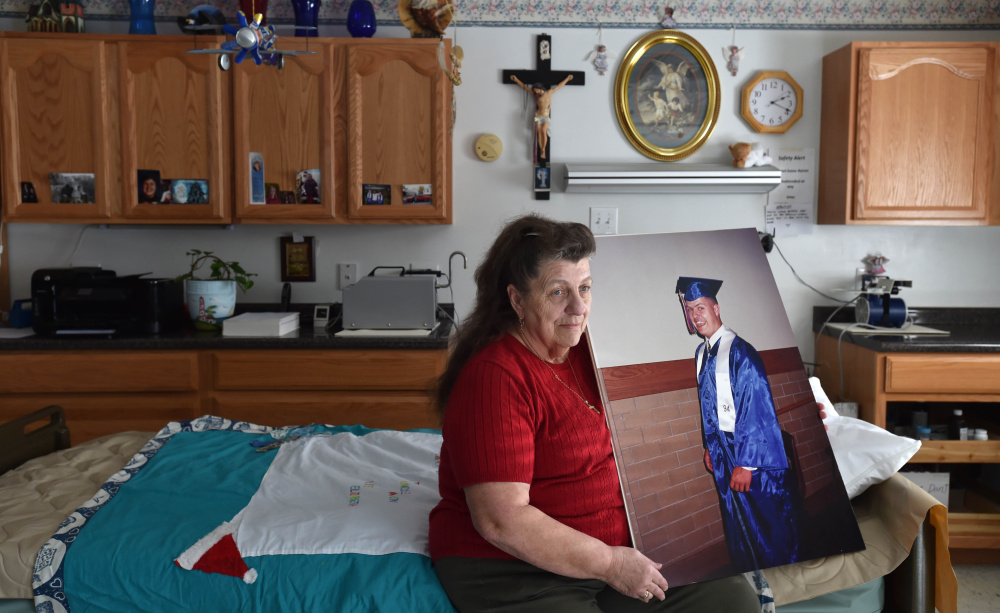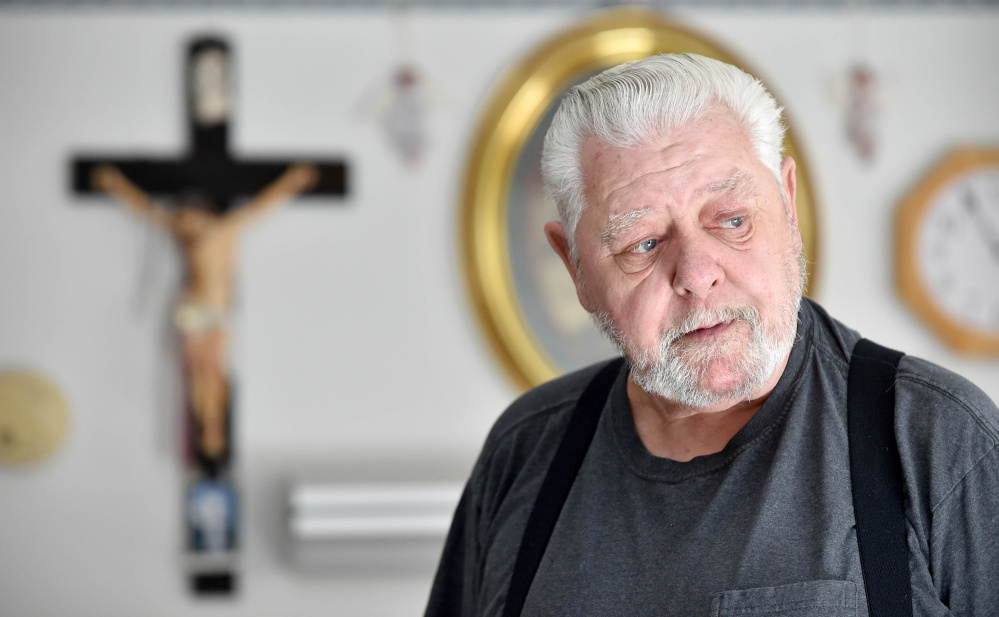OAKLAND — For 21 years Angela Hinck and Edwin Mullen didn’t give up hope that their son Aaron might one day wake up from a coma and fulfill his dream of becoming a Maine State Police trooper.
They took turns caring for him 24 hours a day, communicated with him as best they could, and even built an addition to their house to accommodate his medical needs, filling it with family photos, mementos and a handmade quilt embroidered with “We love you” to cover his bed.
Their dream came to an end April 9 when Aaron Mullen, 40, died after spending more than two decades in a coma.
His family believes that if not for the gunshot wound that pierced the side of his face in October 1994, he would be with them today.
“Aaron never had a life,” said his mother, Angela, 69. “His life was taken from him the day he was shot. He was given a life sentence in his home.”
The Office of the Maine Attorney General will not press murder charges against Jason Poulliot, who was 16 when he shot Mullen.
Poulliot, now 37, served 10 years in prison and was released in 2007. When reached Friday, he said he did not want to comment for this story, but his wife, Katie Poulliot, said that the family “extends our deepest sympathies to the Mullen family – we are truly sorry for their loss.”
The Department of Corrections said last week that Poulliot hasn’t shown back up in the state prison system, and aside from a few civil violations – he pleaded guilty to cultivating marijuana in 2010 and was also convicted of a fishing violation in 2011, according to court records – has stayed out of the news.
Mullen had no insurance at the time of the accident, and his medical care has been paid for in part by MaineCare. The Morning Sentinel reported in 1999 that the community rallied around the family, holding fundraisers and taking up collections, but that dropped off as the years went on.
Because of cuts to state programs, the family had to pay for and even provide some care themselves. Along with a team of nurses, they made sure he was turned over in bed, brushed his teeth and washed his hair and put him in a wheelchair to take him outside.
He couldn’t walk or talk, but communicated in small ways, with his eyes or a smile, and he was capable of small movements like the thumbs up he often gave to family members to show he was happy.
His family believes he was trying to intervene and prevent a crime the night he was shot on Route 23 in Oakland.
“He always wanted to be a state trooper, and that’s what he was doing that night, trying to intervene before the police got there,” said Edwin Mullen, 72.
According to police and witness accounts, Mullen, a 19-year-old gas station attendant at J&S Oil on Kennedy Memorial Drive, was flagged down by his cousin and some friends on his way home from work the night of Oct. 30, 1994.
The teens told him they had been involved in a dispute with a rival group from Fairfield, and that they’d just called the police.
Thinking a police cruiser was on the way, Mullen spotted the two vehicles – a dark pickup truck and a blue Pontiac Sunbird – on Oak Street in Oakland and drove ahead of them to get them to stop. The driver of the truck rammed Mullen’s Nova on Fairfield Street, and he got out of the car to confront the driver.
The Sunbird then drove around the pickup truck, and Poulliot, a passenger, shot Mullen in the head with a .30-30-caliber rifle.
“The barrel was right in his face,” a witness told a Lincoln County jury in October 1996. “They weren’t even a foot away from him”
The bullet entered Mullen’s temple and exited near his mouth. It didn’t penetrate his brain, but police said the shock wave of the bullet interrupted his brain activity, causing him to go into cardiac arrest and suffer seizures.
Poulliot testified in court that he had intended to shoot out the tires of Mullen’s car but that the gun “just went off,” according to Morning Sentinel reporting at the time.
Doctors said Mullen would likely not come out of the coma, but his family never gave up hope. After more than a year in the hospital, they brought Aaron home to Oakland in February 1996, a day that his father called “one of the happiest of my life.”
Since then, Mullen lived mostly at home until his diagnosis with asperation pneumonia last year, an inflamation of the lungs that occurs when they fill with fluid or other foreign material.
Hinck said she forgives Poulliot, though it has been hard for her to find closure to what happened that night in 1994.
“After 21 and a half years at home, you don’t have closure,” she said. “If Aaron had passed on during the injury it may have been different, but when you care for a loved one for so long, it’s overwhelming. Right now I can’t feel about myself, I’m just feeling for Aaron.”
Hinck said the state has been in touch with her about her son’s case, but she’s not interested in seeing new charges brought up.
Lisa Marchese, criminal division chief for the attorney general’s office, said Thursday the state medical examiner has completed a full autopsy, but “even assuming Mr. Mullen died as a result of the original gunshot wound, the state will not be pressing murder charges against Mr. Poulliot.”
Send questions/comments to the editors.





Success. Please wait for the page to reload. If the page does not reload within 5 seconds, please refresh the page.
Enter your email and password to access comments.
Hi, to comment on stories you must . This profile is in addition to your subscription and website login.
Already have a commenting profile? .
Invalid username/password.
Please check your email to confirm and complete your registration.
Only subscribers are eligible to post comments. Please subscribe or login first for digital access. Here’s why.
Use the form below to reset your password. When you've submitted your account email, we will send an email with a reset code.